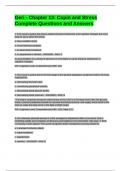-
1. Exam (elaborations) - Healthstream exam: surgeries and procedures questions and answers 100% correct
-
2. Exam (elaborations) - Gms 402 final exam (managerial economics final exam notes) with complete solutions
-
3. Exam (elaborations) - Geri exam 1 practice questions and answers 100% correct
-
4. Exam (elaborations) - Geri actual exam 1 questions and answers 100% accurate
-
5. Exam (elaborations) - Geri final exam questions and answers 100% correct
-
6. Exam (elaborations) - Geri exam 1 test bank| questions and answers 100% correct
-
7. Exam (elaborations) - Geri final exam questions and answers 100% accurate
-
8. Exam (elaborations) - Geri exam 1 questions and answers 100% verified
-
9. Exam (elaborations) - Geri exam 2 practice questions and answers (graded a)
-
10. Exam (elaborations) - Geri actual exam 2 questions and answers 100% correct
-
11. Exam (elaborations) - Geri exam nclex questions and answers (graded a)
-
12. Exam (elaborations) - Geri exam 1 questions and answers 100% verified
-
13. Exam (elaborations) - Geri exam 1| 135 questions and answers 100% correct
-
14. Exam (elaborations) - Geri exam 1 questions and answers 100% verified
-
15. Exam (elaborations) - Geri exam 2 questions and answers 100% correct
-
16. Exam (elaborations) - Geri exam #1 questions and answers 100% correct
-
17. Exam (elaborations) - Geri exam questions and answers 100% correct
-
18. Exam (elaborations) - Geri quiz 1 questions and answers 100% correct
-
19. Exam (elaborations) - Geri mid-term study guide with complete solutions
-
20. Exam (elaborations) - Geri week 2 exam questions and answers 100% correct
-
21. Exam (elaborations) - Some questions geri final with all correct answers
-
22. Exam (elaborations) - Geri chapter 13 pain questions and answers 100% correct
-
23. Exam (elaborations) - Geri exam 2 quiz questions and answers 100% verified
-
24. Exam (elaborations) - Geri midterm practice questions and answers 100% correct
-
25. Exam (elaborations) - Geri chp 12 nclex questions and answers 100% verified
-
26. Exam (elaborations) - Geriatrics nclex questions with all correct
-
27. Exam (elaborations) - Geri nclex: final questions and answers 100% correct
-
28. Exam (elaborations) - Geri final part 1 questions and answers 100% correct
-
29. Exam (elaborations) - Geri test one chapters 1-10 with complete solutions
-
30. Exam (elaborations) - Geri midterm exam questions and answers 100% correct
-
31. Exam (elaborations) - Geri - chapter 13: copin and stress complete questions and answers
-
32. Exam (elaborations) - Geri chapter 5;7;8 questions and answers 100% accurate
-
33. Exam (elaborations) - Ati geri and geri final questions and answers 100% correct
-
34. Exam (elaborations) - Geri nclex ch 9 exam questions and answers 100% correct
-
35. Exam (elaborations) - Geri ch 17 exam questions and answers 100% verified
-
36. Exam (elaborations) - Geri chapter 6 nclex questions and answers 100% verified
-
37. Exam (elaborations) - Geri final nclex questions and answers (graded a)
-
38. Exam (elaborations) - Geri chapter 3 nclex questions and answers 100% accurate
-
39. Exam (elaborations) - Geri nclex questions and answers 100% accurate
-
40. Exam (elaborations) - Comprehensive geriatric assessment exam questions and answers 100% correct
-
41. Exam (elaborations) - Comprehensive geriatric assessment questions with complete solutions
-
42. Exam (elaborations) - Geriatric chapter 7 medications and older adults quiz study questions and answers
-
43. Exam (elaborations) - Comprehensive geriatric assessment exam questions and answers 100% verified
-
44. Exam (elaborations) - Geriatrics/ ltc exam questions and answers (graded a)
-
45. Exam (elaborations) - Geriatrics exam questions and answers 100% correct
-
46. Exam (elaborations) - Geriatrics exam| 97 questions and answers 100% correct
-
47. Exam (elaborations) - (20 - august) comprehensive geriatric assessment (cga) questions and answers 100% cor...
-
48. Exam (elaborations) - Geriatric comprehensive assessment exam questions and answers 100% correct
-
49. Exam (elaborations) - Comprehensive geriatric assessment questions and answers (graded a)
-
50. Exam (elaborations) - Ch 6: comprehensive geriatric assessment questions and answers 100% correct
-
51. Exam (elaborations) - Chapter 4 comprehensive geriatric assessment questions and answers (graded a)
-
52. Exam (elaborations) - Comprehensive geriatric assessment questions and answers 100% accurate
-
53. Exam (elaborations) - Comprehensive geriatric assessment overview-care of older adult-final questions and a...
-
54. Exam (elaborations) - Geriatric nursing exam 1 questions and answers 100% verified
-
55. Exam (elaborations) - Geriatric nursing exam questions and answers 100% correct
-
56. Exam (elaborations) - Comprehensive geriatric assessment questions and answers 100% correct
-
57. Exam (elaborations) - Geriatric exam 1 nclex practice questions and answers 100% correct
-
58. Exam (elaborations) - Geriatric nursing ch. 1,2,3,5, and 10 questions and answers 100% correct
-
59. Exam (elaborations) - Basic geriatric nursing chapter 1 questions and answers 100% correct
-
60. Exam (elaborations) - Geriatrics 1 exam questions and answers 100% correct
-
61. Exam (elaborations) - Chapter 38 geriatrics exam questions and answers 100% correct
-
62. Exam (elaborations) - Geriatric final exam questions and answers 100% correct
-
63. Exam (elaborations) - Geriatric care exam questions and answers 100% accurate
-
Show more




